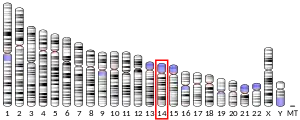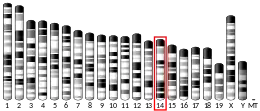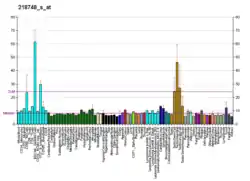EXOC5
Exocyst complex component 5 is a protein that in humans is encoded by the EXOC5 gene.[5][6]
| EXOC5 | |||||||||||||||||||||||||||||||||||||||||||||||||||
|---|---|---|---|---|---|---|---|---|---|---|---|---|---|---|---|---|---|---|---|---|---|---|---|---|---|---|---|---|---|---|---|---|---|---|---|---|---|---|---|---|---|---|---|---|---|---|---|---|---|---|---|
| Identifiers | |||||||||||||||||||||||||||||||||||||||||||||||||||
| Aliases | EXOC5, HSEC10, PRO1912, SEC10, SEC10L1, SEC10P, exocyst complex component 5 | ||||||||||||||||||||||||||||||||||||||||||||||||||
| External IDs | OMIM: 604469 MGI: 2145645 HomoloGene: 38195 GeneCards: EXOC5 | ||||||||||||||||||||||||||||||||||||||||||||||||||
| |||||||||||||||||||||||||||||||||||||||||||||||||||
| |||||||||||||||||||||||||||||||||||||||||||||||||||
| |||||||||||||||||||||||||||||||||||||||||||||||||||
| |||||||||||||||||||||||||||||||||||||||||||||||||||
| |||||||||||||||||||||||||||||||||||||||||||||||||||
| Wikidata | |||||||||||||||||||||||||||||||||||||||||||||||||||
| |||||||||||||||||||||||||||||||||||||||||||||||||||
Function
The protein encoded by this gene is a component of the exocyst complex, a multiple protein complex essential for targeting exocytic vesicles to specific docking sites on the plasma membrane. Though best characterized in yeast, the component proteins and functions of exocyst complex have been demonstrated to be highly conserved in higher eukaryotes. At least eight components of the exocyst complex, including this protein, are found to interact with the actin cytoskeletal remodeling and vesicle transport machinery. The complex is also essential for the biogenesis of epithelial cell surface polarity.[6]
References
- GRCh38: Ensembl release 89: ENSG00000070367 - Ensembl, May 2017
- GRCm38: Ensembl release 89: ENSMUSG00000061244 - Ensembl, May 2017
- "Human PubMed Reference:". National Center for Biotechnology Information, U.S. National Library of Medicine.
- "Mouse PubMed Reference:". National Center for Biotechnology Information, U.S. National Library of Medicine.
- Guo W, Roth D, Gatti E, De Camilli P, Novick P (Apr 1997). "Identification and characterization of homologues of the Exocyst component Sec10p". FEBS Lett. 404 (2–3): 135–9. doi:10.1016/S0014-5793(97)00109-9. PMID 9119050.
- "Entrez Gene: EXOC5 exocyst complex component 5".
- Prigent M, Dubois T, Raposo G, Derrien V, Tenza D, Rossé C, Camonis J, Chavrier P (Dec 2003). "ARF6 controls post-endocytic recycling through its downstream exocyst complex effector". J. Cell Biol. 163 (5): 1111–21. doi:10.1083/jcb.200305029. PMC 2173613. PMID 14662749.
Further reading
- Hsu SC, TerBush D, Abraham M, Guo W (2004). "The exocyst complex in polarized exocytosis". Int. Rev. Cytol. International Review of Cytology. 233: 243–65. doi:10.1016/S0074-7696(04)33006-8. ISBN 9780123646378. PMID 15037366.
- Bonaldo MF, Lennon G, Soares MB (1997). "Normalization and subtraction: two approaches to facilitate gene discovery". Genome Res. 6 (9): 791–806. doi:10.1101/gr.6.9.791. PMID 8889548.
- Kee Y, Yoo JS, Hazuka CD, Peterson KE, Hsu SC, Scheller RH (1998). "Subunit structure of the mammalian exocyst complex". Proc. Natl. Acad. Sci. U.S.A. 94 (26): 14438–43. doi:10.1073/pnas.94.26.14438. PMC 25013. PMID 9405631.
- Hsu SC, Hazuka CD, Roth R, Foletti DL, Heuser J, Scheller RH (1998). "Subunit composition, protein interactions, and structures of the mammalian brain sec6/8 complex and septin filaments". Neuron. 20 (6): 1111–22. doi:10.1016/S0896-6273(00)80493-6. PMID 9655500.
- Brymora A, Valova VA, Larsen MR, Roufogalis BD, Robinson PJ (2001). "The brain exocyst complex interacts with RalA in a GTP-dependent manner: identification of a novel mammalian Sec3 gene and a second Sec15 gene". J. Biol. Chem. 276 (32): 29792–7. doi:10.1074/jbc.C100320200. PMID 11406615.
- Polzin A, Shipitsin M, Goi T, Feig LA, Turner TJ (2002). "Ral-GTPase influences the regulation of the readily releasable pool of synaptic vesicles". Mol. Cell. Biol. 22 (6): 1714–22. doi:10.1128/MCB.22.6.1714-1722.2002. PMC 135608. PMID 11865051.
- Inoue M, Chang L, Hwang J, Chiang SH, Saltiel AR (2003). "The exocyst complex is required for targeting of Glut4 to the plasma membrane by insulin" (PDF). Nature. 422 (6932): 629–33. Bibcode:2003Natur.422..629I. doi:10.1038/nature01533. hdl:2027.42/62982. PMID 12687004. S2CID 4395760.
- Moskalenko S, Tong C, Rosse C, Mirey G, Formstecher E, Daviet L, Camonis J, White MA (2004). "Ral GTPases regulate exocyst assembly through dual subunit interactions". J. Biol. Chem. 278 (51): 51743–8. doi:10.1074/jbc.M308702200. PMID 14525976.
- Prigent M, Dubois T, Raposo G, Derrien V, Tenza D, Rossé C, Camonis J, Chavrier P (2004). "ARF6 controls post-endocytic recycling through its downstream exocyst complex effector". J. Cell Biol. 163 (5): 1111–21. doi:10.1083/jcb.200305029. PMC 2173613. PMID 14662749.
- Brandenberger R, Wei H, Zhang S, Lei S, Murage J, Fisk GJ, Li Y, Xu C, Fang R, Guegler K, Rao MS, Mandalam R, Lebkowski J, Stanton LW (2005). "Transcriptome characterization elucidates signaling networks that control human ES cell growth and differentiation". Nat. Biotechnol. 22 (6): 707–16. doi:10.1038/nbt971. PMID 15146197. S2CID 27764390.
- Lim J, Hao T, Shaw C, Patel AJ, Szabó G, Rual JF, Fisk CJ, Li N, Smolyar A, Hill DE, Barabási AL, Vidal M, Zoghbi HY (2006). "A protein-protein interaction network for human inherited ataxias and disorders of Purkinje cell degeneration". Cell. 125 (4): 801–14. doi:10.1016/j.cell.2006.03.032. PMID 16713569.
This article is issued from Wikipedia. The text is licensed under Creative Commons - Attribution - Sharealike. Additional terms may apply for the media files.




